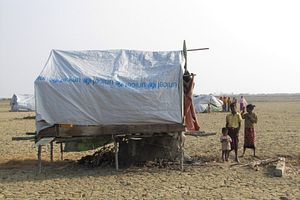Southeast Asia, with its ten countries squeezed into an area half the size of China and a volatile mix of politics and old-fashioned hatreds, has no shortage of issues with refugees, internally displaced people (IDPs), asylum seekers, illegal immigrants, smugglers, and traffickers.
Its porous borders and overstretched police mean there is no shortage of people prepared to try their luck in search of a safer, and perhaps more prosperous, life, as witnessed by the exodus of Rohingya Muslims out of Myanmar last year which left thousands stranded at sea.
Their story holds a familiar ring. BBC News has detailed the plight of thousands of Christian refugees from Pakistan, arrested and detained in Thailand after fleeing persecution in their own home. Some were arrested despite being registered by the United Nations as asylum seekers.
Christians in Muslim-dominated Pakistan have always proved an easy target for the Taliban and like-minded militias who dole themselves up as jihadists and use a twisted logic to justify their thuggish behavior. That includes a convert or die attitude towards Christians.
The BBC quoted Pastor Joshua, a Christian from Lahore, who fled to Thailand and still fears those in Pakistan who decided to punish him for converting from Islam to Christianity. “My bone was broken – the one right above the heart. And they tried to cut my arm off,” he said. “My sister was murdered, she was burned alive, just because she spoke the word ‘God’. They hate the word ‘God’ so much. She was burned for this reason alone.”
Their plight is severe, but they are far from alone. There a million-plus refugees housed in water villages around the north coast of Borneo in the East Malaysian state of Sabah. They have been there for around 40 years, with at least two generations of children reared who do not hold any connection to their Filipino roots.
Refugees are an issue that has bedeviled the region and beyond – from Hong Kong to New Zealand – for decades. More importantly, it will continue to do so unless a genuine deal can be reached and honored by regional governments, who have much at stake.
On a per capita basis, Australia accepts more recognized refugees for resettlement than any other country in the world and is ranked third overall in terms of sheer numbers. But it only takes those that have been processed by the United Nations High Commissioner for Refugees (UNHCR), the UN’s refugee agency, and asylum seekers arriving as illegal immigrants by boat are re-directed to Nauru and Manus Island in Papua New Guinea, where their claims are processed.
Over the last two-and-a-half-years this has proved effective in ending the people smuggling rackets which plied the Indian Ocean and Timor Sea to Australia, costing the lives of many who perished in unseaworthy vessels. The problem is hundreds have been left stranded in Australian-funded camps on Nauru and Manus.
A push to have them resettled in Cambodia has effectively further frightened off potential asylum seekers, who are now heading for Europe. But as a resettlement exercise it failed because only a handful have agreed to settle there.
In ASEAN, meanwhile, only two member states – Cambodia and the Philippines –have signed up to the UN’s Refugee Convention.
Malaysia, a Muslim-majority nation which has accepted migrants through UNHCR, has also faced allegations that it was using Muslims fleeing the conflict in the southern Philippines to bolster the number of Muslims living in Sabah, once a predominantly Christian state.
There has also been local speculation that identity cards and citizenship papers have been handed out in return for support for the long-ruling United Malays National Organization (UMNO), which is suffering under Prime Minister Najib Razak and allegations of massive corruption.
A regional rethink and a consensus would help.
If there is going to be a solution then Southeast Asia — perhaps through ASEAN — Australia, Nauru, and Papua New Guinea must also be involved in a regional dialogue along with other countries in the region that are in a position to offer resettlement but tend to shy away. That includes the likes of South Korea and Japan.
Luke Hunt can be followed on Twitter @lukeanthonyhunt
































